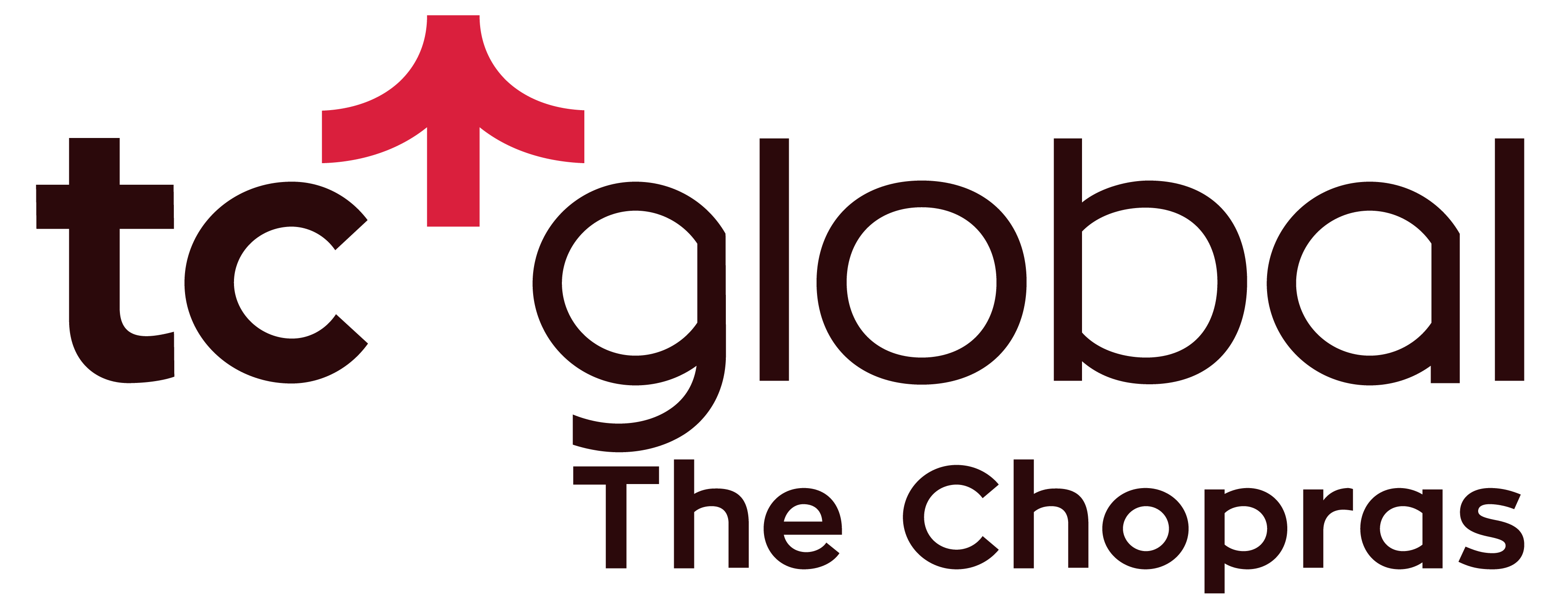If you are looking at studying nursing, then a look at nursing colleges in Canada is a good idea.
According to the 2021 report by the U.S Bureau of Labor Statistics, about 276,000 additional registered nurses are expected to be required between 2020 to 2030 – in the US alone. The number of registered nurses positions are expected to increase from 3.08 million to 3.36 million soon.
The demand for nurses is expected to go up in the coming years, and it is estimated that students looking to get into healthcare or nursing will find higher relatively employment rates than any other profession.
Being a land of opportunities, Canada offers plenty of programs across several fields including healthcare, engineering and others. However, we know that choosing the right college in Canada for nursing can be a challenge. This is why we bring you a list out the top universities in Canada for nursing.
Canada is a boon to students in many ways – from plenty of employment opportunities to high quality of living, the country only has the best things to offer. Let’s discuss some of the top reasons why nursing students would enjoy studying in Canada.
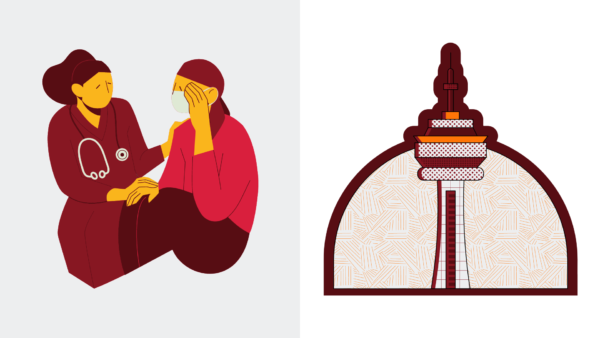
- Nursing programmes across Canadian universities and colleges offer several specialisations including,
- Midwifery
- Cardiac nursing
- Emergency nursing
- Oncology nursing
- Geriatric nursing
- Opens up a large number of opportunities across the healthcare sector around the world.
- With over 10 universities in top ranked 150 institutions globally, Canada has some of the best universities in the world.
- The average salary package in Canada for nurses is around CAD 50,000 – CAD 105,000, making it one of the highest paid professions within the country.
- The large demand for nurses in the country ensures that most nursing graduates and other healthcare professionals find employment in Canada post graduation.
Generally, an international student may require anywhere between CAD 1000 – CAD 3000 (excluding tuition) depending on one’s lifestyle. Some of the common expenses are listed below.
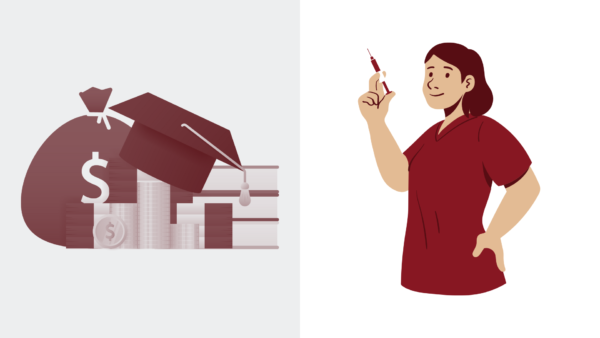
Food
The average cost of food is around CAD 200 to 300 CAD a month.
Accommodation
On average, the accommodation costs in Canada are between CAD 400 to CAD 1,500 a month (from dorms to rooms for rent).
Transportation
The average cost of transportation in Canada is between CAD 100 to CAD 200 a month.
Utilities
The average cost of utilities in Canada is between CAD 90 to CAD 300 a month.
Miscellaneous
Miscellaneous expenses in Canada include Insurance, Internet, Books, Leisure, and others. This could come up to around CAD 600 to CAD 700 a month.
Tuition
The average tuition fee for studying nursing in Canada is around CAD 25,000 per year.
Some of the available scholarships across Canadian universities for those applicants interested in pursuing a Nursing degree include,
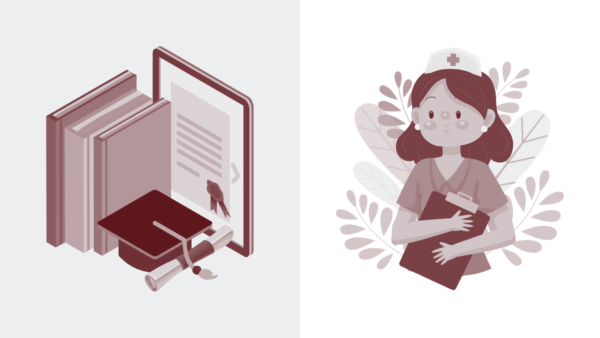
General eligibility criteria for Undergraduate programs
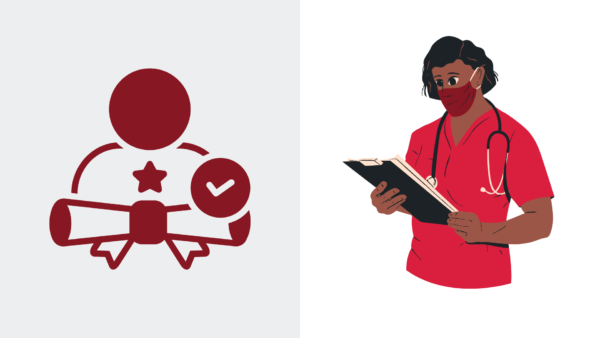
- A minimum of 65% to 75% average in 12th-grade level examinations with Mathematics, Physics, Chemistry, Biology, and English as core subjects (depending on the university one is applying to)
- International applicants who have studied in universities outside of North America need to submit their course evaluation through World Education Services (WES)
- TOEFL/IELTS scores
- Statement of purpose
- Academic transcripts
- CASPer test (Computer-Based Assessment for Sampling Personal Characteristics)
General eligibility criteria for Postgraduate programs
- A few Canadian nursing colleges and universities require international students to be available for residency periods on campus.
- Completion of a bachelor’s degree in nursing (e.g., BScN, BSN, BN)
- GPA of 78% (B+) or higher in the last two years of full-time study
- Must show proof of RN registration in their home country
- World Evaluation Series (WES) reports monitoring degree equivalency
- References
- Curriculum vitae
- Academic transcripts
- Essays
- Must meet English language proficiency requirements (TOEFL/IELTS/PTE etc)
General eligibility criteria for Ph.D. programs
- Completion of a bachelor’s degree in nursing (e.g., BScN, BSN, BN).
- A master’s degree or a graduate certificate in nursing or another health care-related field.
- Nurses educated outside of Canada may be asked to submit a WES report to monitor degree equivalency
- GPA of 78% (B+) or higher
- Completion of a master’s thesis/research project
- Ph.D. candidates may have to attend an interview with a panel of core faculty
- International candidates must satisfy English language proficiency requirements (TOEFL/IELTS/PTE etc)
- Academic references
- Curriculum vitae
- Personal essays
- Academic transcripts
- Supervisory agreement (A faculty member of the university must agree for supervision. The faculty member’s research must align with the applicant’s interests)
Canada is one of the best global ed destinations in the world. The country’s academic prowess, coupled with the substantial amount of employment opportunities that it offers has made it an alluring destination for international students.
Today, we take a look at some of the best Canadian universities for nursing. We’ve also covered nursing courses in the UK, in case that’s the market of your interest.
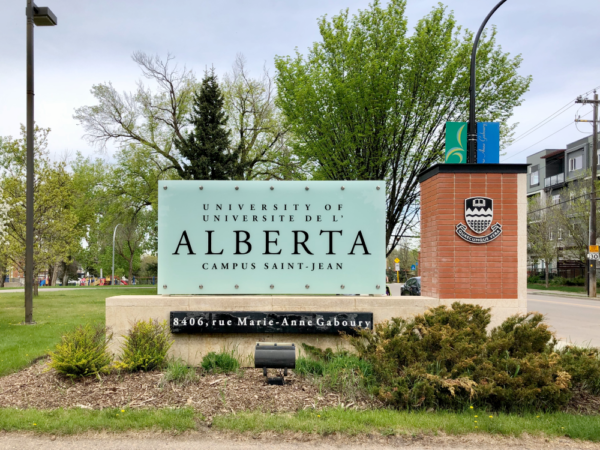
Established in 1908, the University of Alberta has consistently ranked amongst the top universities of Canada. The university was ranked 110th by the QS World University Rankings 2023 list of the top global institutions.
Why is it good to study here?
The Faculty of Nursing at the University of Alberta is ranked 1 in the country for nursing. It has been ranked 10 globally for nursing-related subjects. The faculty of nursing is renowned for excellence in education, and research.
Fees & Scholarship options
The tuition fee to pursue the four-year BScN program at the University of Alberta is around CAD 116,769.60.
Some of the popular scholarships available at the university include,
Eligibility and Duration
The eligibility criteria for international students who are applying directly from high school include
- One of the courses including
- English (Literature & Composition)
- Biology
- Chemistry
- Calculus
- Mathematics
- One of the following subjects
- English Language Proficiency Test scores (TOEFL/IELTS)
- Academic transcripts
Courses offered & admission process
The courses offered include,
The application process involves the following steps –
- Reviewing admission requirements and application
- Submission of university application form uab.ca/apply.
- Ualberta Launchpad can help applicants to keep track of their application status
- Apply to CASPer test (Computer-Based Assessment for Sampling Personal Characteristics) and submit scores
- Receive student ID and campus computing ID
- Check the to-do list at launchpad and submit the necessary documents
- Apply for scholarships, awards, etc
- Check admission decision
- Accept offer
- Pay tuition deposit
- Review health and safety requirement
- Pay tuition
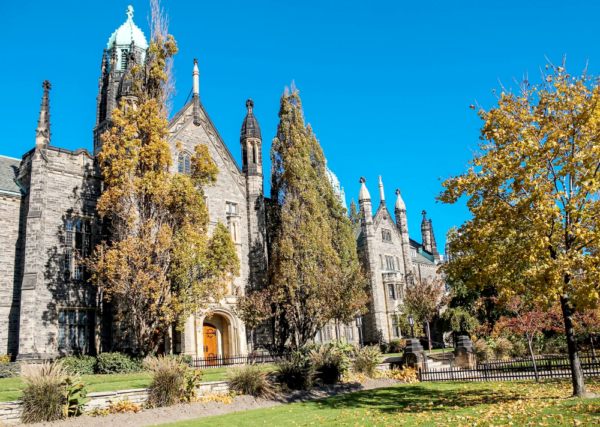
Ranked 34th by the QS World University Rankings 2023 list of global institutions, the University of Toronto is one of the most prestigious institutions in the world. The university enjoys a great reputation in academics and research and has been continuously producing first-class healthcare professionals since its inception.
Why is it good to study here?
The nursing school at the University of Toronto offers some of the best nursing programmes. The school also has a state-of-the-art medical laboratory for students to avail hands-on experience.
Partnerships with Canada’s leading teaching hospitals help students to understand and be a part of real-life situations to nurture them into becoming well-rounded healthcare professionals.
Fees & Scholarship options
The first-year tuition fee for BScN at the Lawrence S. Bloomberg Faculty of Nursing is CAD $45,164.88 while the second-year tuition fee is CAD 45,088.88.
Scholarships provided at the University of Toronto include,
Eligibility and Duration
The eligibility criteria for getting admitted into the University of Toronto include,
The duration of the BScN program is 2 years.
Courses offered & admission process
The courses offered include,
- Bachelor of Science in Nursing (BScN)
- Master of Nursing (MN)
- Post-Master Nurse Practitioner Diploma (PMNP)
- Collaborative Specializations for MN and Ph.D. Students
- Doctor of Philosophy (Ph.D.)
- Doctor of Nursing (DN)
The admission process for BScN involves,
- New applicants need complete the Ontario Universities’ Application Centre (OUAC) 105 Application Form
- Once an application number has been received, users will have to log into the Join U of T Portal to submit their supplementary application
- Click Bloomberg Nursing Supplementary Application under Required Documents; then click Start New Application
- After clicking on “Create Application”, an “Open Application” button will automatically appear, clicking on it will take you to the application portal.
- Submit a copy of your transcript(s)
- Submit proof of English facility (if required)
- Apply for relevant admission awards , if needed.
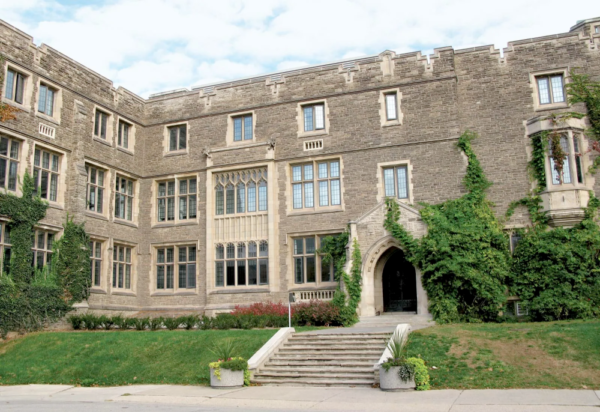
One of the only four Canadian universities to be consistently ranked in the top 100 global universities, McMaster University is a well-known centre for academic excellence and groundbreaking research.
Why is it good to study here?
McMaster’s School of Nursing has been ranked 3rd in Canada and 21st in the world. With state-of-the-art facilities and impeccable hands-on training, the school of nursing ensures that its students gain the right experience required to become exemplary healthcare professionals.
Fees & Scholarship options
The tuition fee for pursuing the BScN Basic program is CAD 46,043.70 a year.
Some popular scholarships offered by the university include,
Eligibility and Duration
The eligibility criteria for BScN Basic program include…
- The following are the minimum Grade 12 U and M requirements under the OSS curriculum:
- English U
- Biology U
- Chemistry U
- One of Advanced Functions U, Calculus and Vectors U, or Mathematics of Data Management U
- Two additional Grade 12 U or M courses to a total six courses
- GPA of at least B in all university degree credit courses taken
- CASPer assessments
The duration of the BScN Basic program is 4 years while the accelerated and post-diploma RPN streams are 20 months and 3 years respectively.
Courses offered & admission process
The courses offered include,
The admission process includes,

The University of British Columbia has been ranked among the top 20 public universities in the world. Since 1915, the university has been providing opportunities to thousands across different disciplines.
Why is it good to study here?
The faculty members serve as advisors at the Ministry of Health. Some of the popular clinical partners include Provincial Health Services Authority, Fraser Health, and Providence Health Care. While some of the graduates maintain highly skilled practice, others contribute to health education through research.
Fees & Scholarship options
The average tuition fee is around CAD 56,545.97 for one year.
Some of the popular scholarships include,
- Karen McKellin International Leader of Tomorrow Award
- International Impact Award
- Vantage One Excellence Award
- International Major Entrance Scholarship
- Outstanding International Student Award
Eligibility and Duration
The eligibility criteria include…
- General Certificate of Secondary Education (GCSE) or General Certificate of Education or international baccalaureate or equivalent.
- English language proficiency test scores
The duration of the BSN program at the Okanagan campus is four years.
Courses offered & admission process
The courses offered at the university include,
The admission procedure includes…
- Applying through youbc Okanagan.
- Submission of documents
- Notification of admission decisions is given to applicants after all necessary documents have been received and evaluated.
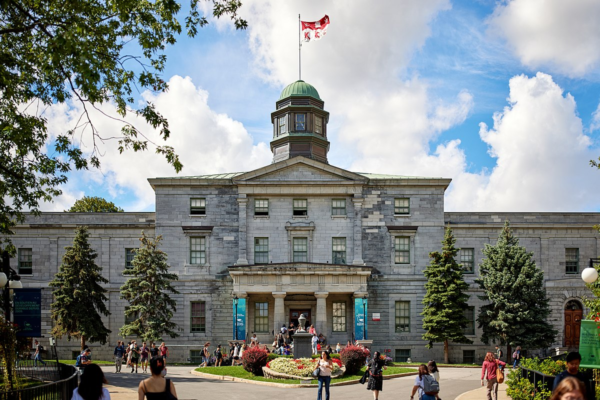
McGill University is one of Canada’s most popular institutions of higher education. Founded in 1821, McGill is recognize for its excellence in teaching and research programs.
Why is it good to study here?
The Ingram School of Nursing at McGill University has been providing nursing education since 1920. The school aims to educate current and future nurses while also advancing the state-of-the-art of nursing and healthcare.
Fees & Scholarship options
The average tuition fee for BSc (N) is CAD 29,445.34/year.
Scholarships include,
Eligibility and Duration
Eligibility criteria include…
- Minimum of 75% to 85% in higher secondary examinations
- Subjects must include mathematics and two of biology, chemistry or physics in Class 11 and 12.
- Proof of French proficiency
The duration of the BSc (N) program is 3-4 years.
Courses offered & admission process
The courses offered include,
- BScN
- BNI
- MScA (AN)
- MScA (N)
- PhD
The admission process involves
- Applications can be sent in through McGill’s online application.
- Evaluate your eligibility
- Send in application
- Apply for an entrance scholarship
- Submit documents and stay in touch

The University of Calgary is a public university that was started in 1944 under the university of Alberta before becoming an autonomous university in 1966. The university has 5 campuses and 14 faculty.
Why is it good to study here?
The university’s Faculty of Nursing has been ranked 6th in Canada and 40th in the world by QS rankings in 2022. The school has been producing skillful nurses for the past 50 years.
Fees & Scholarship options
The tuition fee for each term of BN is CAD 2,440.80.
Scholarships offered at the UCalgary include
- UCalgary International Entrance Scholarship
- the University of Calgary International Baccalaureate Diploma Entrance Scholarship
- President’s Admission Scholarship
Eligibility and Duration
The eligibility criteria include
- Required courses of admission include English, Mathematics, Chemistry, Biology
- IB courses or Advanced Placement courses are accepted
- English Language Proficiency
Courses offered & admission process
The courses offered include,
- Bachelor of Nursing (BN, Indigenous community route, or rural community route)
- DN
- Nursing – Cert
- Nursing – MN (course or thesis-based)
- PhD
The admission process includes…
- Starting the application
- Submission of application along with the fee of CAD 145
- Submission of required documents
- Admission decision
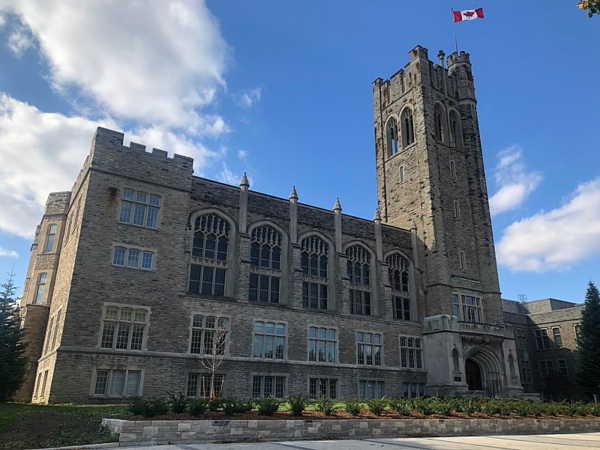
Founded in 1879 and later opened to the public three years later, Western University has been one of Canada’s leading universities for a long time.
Ranked 172nd by the QS World University Rankings 2023 list of global universities, Western University has 12 faculties including the School of Graduate and Postdoctoral Studies, Medicine, Business, Law and Engineering, among others.
Why is it good to study here?
The Arthur Labatt Family School of Nursing at Western University focuses on educating nurses who are reflective practitioners and possess relevant competency in nursing theory and practice, research, learning, and policy advancement.
The compressed time frame BScN program helps those students with prior university experience for careers as RNs and also acts as a qualification for graduates to apply for registration with the College of Nurses of Ontario.
Fees & Scholarship options
The tuition fee for the Western-Fanshawe College collaborative BScN program is CAD 50,000.
Popular Scholarships offered at Western University include
- A.M.F.G. Award in Nursing (Western-Fanshawe Collaborative Nursing program)
- Arthur Labatt Family Undergraduate Scholarships in Nursing (for BScN [CTF] program)
Eligibility and Duration
The admission requirements for the BScN Western Fanshawe Collaborative Program include…
- International applicants who are looking to practice as RNs in Ontario must review the residency requirements for the College of Nurses of Ontario (CNO).
- CASPer test (Computer-Based Assessment for Sampling Personal Characteristics)
- TOEFL/IELTS scores
- Minimum of 70% overall average for those who apply from a university with less than 10 full courses
- Minimum of overall average in last 10 full courses for those who apply from a university with more than 10 full courses
- Must have completed the equivalent of the following Ontario high school courses with a minimum grade of 65%
- Physics
- Chemistry
- Biology
The duration of the BScN Western-Fanshawe Collaborative Program is 4 years.
The duration of the BScN CTF program is 19 months.
Courses offered & admission process
The courses offered by the Arthur Labatt Family School of Nursing at Western University include
Students must apply through Ontario Universities’ Application Centre where they can apply through both Western University as well as Fanshawe College since the program is a collaborative venture between the two.
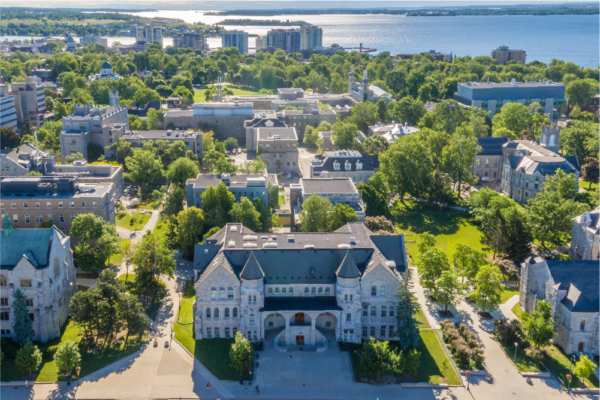
Established in 1841, Queen’s University is highly ranked in Canada for student experience. It is among Canada’s oldest universities. The university is ranked 246th in the QS university rankings list for 2022.
Why is it good to study here?
The school of nursing at Queen’s University has ranked 8th in Canada and within the top 100 institutions for nursing globally. The school ensures that the program curriculum is current and relevant. It is part of the Faculty of Health Sciences, providing inter-professional learning opportunities.
Fees & Scholarship options
The tuition fee is CAD 26,786/year.
The scholarships offered by the school include
- First-Entry Undergraduate Financial Aid
- Queen’s General Bursary (QGB)
Eligibility and Duration
Eligibility criteria include
- High school transcripts
- English language proficiency scores
- Minimum of 75% at XII with English, Biology, Mathematics, and Chemistry
The duration of the BNSc program is 4-years.
Courses offered & admission process
The school offers courses including
- BNSc (4-year)
- BNSc (2-year accelerated)
- MNSc (PHCNP)
- Master of Nursing (PHCNP)
The admission process includes (this is a basic list):
- Check admission requirements
- Apply online
- Activate NetID
- Submit supplementary information
- Check to-do list

The University of Ottawa was founded in 1848 and is one of Canada’s oldest and most prestigious higher education institutions. Globally, the university has been ranked 232nd by QS rankings of 2022.
Why is it good to study here?
The four-year honours BScN degree helps students to prepare for the challenges that bug the healthcare sector. The program is offered across different campuses, including Ottawa, Woodroffe, and Pembroke.
Fees & Scholarship options
The fee to pursue BScN is CAD 19,346.02/term.
Some of the popular scholarship options include,
Eligibility and Duration
The eligibility criteria include,
- Check if the language requirements are satisfied
- All prerequisite courses of secondary studies must be completed
- Additional supporting documents depending on the program.
The Honours BScN program’s duration is 4 years.
Courses offered & admission process
The courses offered include
- Honours BScN
- Diploma PHCNP
- MScN
The admission process includes
- Keeping track of deadlines
- Begin the application process through ouac.on.ca
- Submit necessary documents
- Request study permit
- Apply for housing and paying fees
- Submission of original transcripts
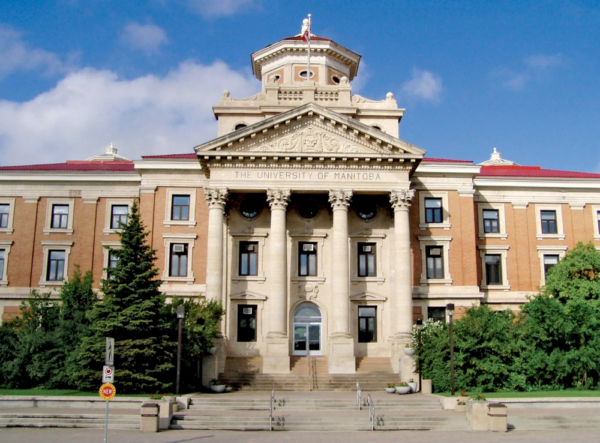
The University of Manitoba has been consistently ranked among some of the top Canadian and global institutions. Founded in 1877, the university has campuses across Anishinaabeg, Cree, Oji-Cree, Dakota and Dene.
Why is it good to study here?
The college of nursing at the University of Manitoba focuses on producing nurses of high quality, with the ability to provide compassionate care and care for patients’ wellness. The BN program is offered at Winnipeg and The Pas and Thompson through collaborations with the University College of North.
Fees & Scholarship options
The tuition fee for the BN program is CAD $20,600.
Some of the popular scholarship options include
- International Undergraduate Student Entrance Scholarships
- International Undergraduate Student Scholarships
- University of Manitoba General Entrance Scholarships
- Chown Centennial Scholarship
- The Asper Foundation Entrance Bursary
Eligibility and Duration
The eligibility criteria include
- Required courses for admission
- Adjusted Grade Point Average (AGPA) calculation and requirements
- Written English and mathematics requirements
- Humanities, Social Sciences, and Science electives
- Proof of English language proficiency
The BN program’s duration is 28 months.
Courses offered & admission process
The courses offered include
- Bachelor of Nursing
- Bachelor of Midwifery
- Master of Nursing
- MN – NP
- PhD
The admission process involves
- Begin application online here
- Submission of necessary documents
- Pay the application fee of CAD 120
- Admission decision
- Fee payment
One-year and two-year programs are quickly becoming more popular amongst the latest crop of graduates. In Canada, there are several two-year courses offered across levels, including diplomas, masters, graduate diplomas, and others.
Most of the two-year courses that are offered across Canadian universities require students to attend them on-campus, thereby increasing the scope of hands-on training. Some of the top colleges and universities in Canada that offer two-year nursing programs include,
- Georgian College – Practical Nursing Ontario College Diploma program (2.5 years)
- Stenberg College – Practical Nursing (76 weeks/1.5 years includes 23 weeks of hands-on training)
- Durham College – Practical Nursing (5 semesters/2.5 years)
- Thompson Rivers University – Practical Nursing Diploma (2 years)
- Fanshawe College – Practical Nursing (63 weeks)
- Humber College – Practical Nursing (4 semesters)
- Conestoga College – Practical Nursing (2 years)
- University of Windsor – Master of Science in Nursing Degree (2 years)
- University of Saskatchewan – Master of Nursing (2 years)
The average cost of pursuing a two-year program in Canada ranges from CAD 10,000 to CAD 170,000, depending on the Bachelor of Science in Nursing (BSN) level that students choose.
Some of the common subjects covered in two-year programs include
- Mental Health and Psychiatric Nursing
- Microbiology
- Fundamentals of Nursing
- Genetics
- Personal Hygiene,
- Community Health Nursing
- Nutrition
- Pediatric Nursing
- Critical Care Nursing,
- Pharmacology and Medication Management,
- Human Anatomy and Physiology
That was a comprehensive list of some of the top colleges in Canada. If you are looking at any other global destination, then can also explore nursing courses in Australia – another country that’s facing a severe shortage of healthcare professionals.
You May Also Like:
